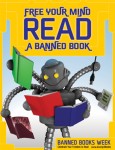 As another Banned Books Week comes to an end, I thought I would make mention of a few other items that appeared in the blog world about it this week, along with a news item.
As another Banned Books Week comes to an end, I thought I would make mention of a few other items that appeared in the blog world about it this week, along with a news item.
Two blogs took rather unique approaches to Banned Books Week. NYRB Classics blog highlighted some of its authors who struggled with censorship throughout their careers. Meanwhile, the Los Angeles Review of Books blog gave banned authors a chance to talk about what it’s like to have your book “banned,” including two novelists with books on the 2010 top 10 list of most frequently “challenged” titles.
What did I like about Flavorwire’s 10 books deemed too dangerous to read? One of my Desert Island Books is on the list plus one of my favorite books this year — both by the same author.
Laura Miller at Salon gave a tongue-in-cheek nod to the week with a post about books that deserve to be banned. She asks a key question for many high school students taking literature: “Where were these censors when we really needed them — that is, when our 10th-grade teachers assigned ‘Beowulf’ or ‘The Pearl’?” Interestingly, one theme of the responses from readers is that the problem with a book stemmed not from the itself but “the quality — or lack — of accompanying instruction.”
A more serious perspective came from an interesting source — the Canadian addition of HuffPo. In To Ban or Not To Ban, Jonathan Mendelsohn observes, “As certain as death or taxes, it seems that so long as there are folks writing books there will always be those banning them.”
And I learned in the U.S. version of HuffPo that Lisa Catherine Harper seems to have the same attitude toward kids and reading as I did with my daughters. “[E]very time we limit our kids reading, we are effectively banning books. But kids should read what they want to read. If they can read it, they should be able to read it. I won’t censure my kids reading, and I will read to them any book they bring to me.”
Finally, a bit of irony in a news story this week shows why we have Banned Books Week. The Glendale (Calif.) Unified School District is considering blocking a request by a high school English teacher to add In Cold Blood to the Advanced Placement English curriculum. For those who may not know, AP English is a class in which the national AP exam can earn you college credit if you head to college. Evidently, opponents think the book is too violent for 11th grade minds. (And although not directly related, there was also a story that an Alabama prison inmate with a life sentence sued prison officials after they seized a book they considered too incendiary and provocative — the 2009 Pulitzer Prize winner for general nonfiction.)
Anyway, if you’re looking for something to do this weekend — or any time — pick up a banned book and read it. It will do you good.
Everything I Need To Know About Life I’ve Learned By Reading Banned Books
Bumper sticker on my vehicle (purchased at
Food for Thought Books Collective)







